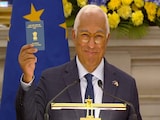President Joe Biden's opposition to capital punishment will be put to the side Wednesday when the US Justice Department tries to convince the Supreme Court to reinstate the death penalty for Boston Marathon bomber Dzhokhar Tsarnaev.
Tsarnaev, 28, was 19 when he and his older brother Tamerlan Tsarnaev planted two home-made bombs near the finish line of the April 15, 2013 race, killing three people and injuring 264 others.
On the run, the two also killed a policeman. Tamerlan was then killed in a gunfight with police.
In 2015 Dzhokhar Tsarnaev was convicted on 30 counts and given the death penalty as well as sentences of life in prison.
The case was appealed on issues of alleged trial irregularities including in the jury.
In July 2020 the appeals court left in place most of the convictions but annulled the death sentence and ordered the lower court to hold a new sentencing trial with a new jury.
In October the Justice Department, then under pro-capital punishment attorney general Bill Barr, appealed the ruling to the Supreme Court.
Since then Biden became president, and replaced Barr with a new attorney general, Merrick Garland, who inherited the appeal to the high court.
Despite Biden's opposition to the death penalty, the Justice Department has not indicated any change in its stance in the case.
The appeals court accepted arguments that the jury had not originally been questioned enough on their exposure to media information on the highly publicized bombing.
It also agreed with defense attorneys that, at sentencing, the jury was not provided vital information that Tsarnaev had allegedly been influenced by his older brother, who had a criminal record.
Tsarnaev's attorneys say it was impossible for the jury to have avoided massive commentary on the case, including calls for execution, and the members should have been asked about it before the trial took place.
In a filing to the high court, the Justice Department argued that jurors are able to decide a case fairly even if exposed to publicity about before it is tried.
And it rejected the argument that Dzhokhar Tsarnaev had been directed by Tamerlan in the crime.
"The record definitively demonstrates that respondent was eager to commit his crimes, was untroubled at having ended two lives and devastated many others, and remained proud of his actions," it said in a filing.
"This court should reverse the decision below and put this case back on track toward a just conclusion."
After Wednesday's arguments, the Supreme Court should make a decision by June 2022.
(Except for the headline, this story has not been edited by NDTV staff and is published from a syndicated feed.)















